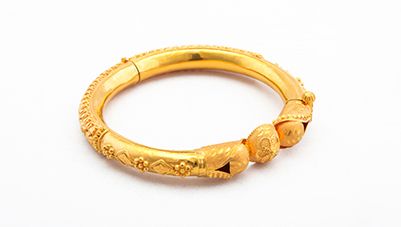Rs. 5,000 - Rs. 2 crore
To find the nearest gold loan branch,
Enter phone and OTP | Check amount you can get | Apply for quick funds
Understanding gold ownership and regulations in India
Gold has always held a special place in Indian homes, symbolising wealth, prosperity, and emotional value. Many families choose to invest in gold—whether as jewellery, coins, or bars—because it is seen as a safe and lasting asset. However, there are certain laws and tax rules you should know about when it comes to storing or using gold. Being aware of these regulations can help you avoid unnecessary issues or penalties. This section breaks down everything you need to know about gold storage, taxation, and how you can even use your gold for financial purposes.
What is the legal limit for keeping gold at home?
In India, there is no fixed legal cap on how much gold you can keep at home, but you must be able to explain where it came from if questioned. During tax inspections, authorities often look for documentation or proof of income, especially when large amounts of gold are found. As a general guideline, married women can keep up to 500 grams, unmarried women up to 250 grams, and men up to 100 grams without facing queries. These limits help tax officials distinguish between genuine personal gold holdings and unaccounted assets.
How much gold is allowed to keep at home in India?
There is no direct restriction on the quantity of gold an individual can hold at home. However, during income tax raids, individuals must justify the gold they possess. The government has provided guidelines to tax officers: married women can hold up to 500 grams, unmarried women up to 250 grams, and men up to 100 grams of gold without any need for justification. Larger quantities of gold are allowed if you can provide legitimate documentation, such as bills, inheritance records, or tax returns, demonstrating the gold’s acquisition through declared income or other lawful means.
What is the gold storage limit per person in India?
The gold storage limit per person in India varies based on gender and marital status. Married women can legally store up to 500 grams of gold, while unmarried women are allowed up to 250 grams. Men, regardless of their marital status, can keep up to 100 grams. These limits are primarily applicable when income tax authorities conduct raids, allowing them to identify acceptable amounts of personal gold holdings. If you possess more than the allowed limit, you must provide documentation to verify that the gold has been legally acquired. There are no penalties for exceeding these limits if proper documents are in place.
Pro tip: Before you pledge your gold, know your options. Check your gold loan eligibility and choose the right amount and tenure.
Limits and income tax rules on the storage of different types of gold
Gold can be stored in various forms, including jewellery, coins, and bars. Indian tax authorities primarily focus on the source and documentation of the gold you store, not the form it takes. Married women are permitted to hold up to 500 grams of gold jewellery, while unmarried women can store 250 grams, and men can possess 100 grams without question. However, if you own coins or bars, the rules remain the same – the key concern is providing proof of legitimate acquisition. If you exceed these limits, clear records of purchase or inheritance must be presented during an income tax audit to avoid penalties.
How is gold taxed in India?
Gold in India is taxed based on its nature and the holding period. When selling gold, if held for less than three years, it falls under short-term capital gains (STCG) and is taxed according to your income slab. For gold held for more than three years, it is classified under long-term capital gains (LTCG), and a flat tax rate of 20% is applied after indexation benefits. When receiving gold as a gift or inheritance, no tax is levied, but the recipient may have to pay capital gains tax when selling it. Additionally, purchasing gold attracts Goods and Services Tax (GST) at 3%.
Is there a limit to how much gold I can buy in India?
There is no specific legal limit on how much gold an individual can purchase in India. However, purchases above ₹2 lakh require PAN card details to be provided, as per the government's regulations. Large transactions are subject to scrutiny by the income tax department to ensure that the money used for the purchase is accounted for and declared in income tax returns. Although buying gold in significant quantities is allowed, individuals must ensure that their transactions are transparent and recorded to avoid any legal complications during tax assessments.
How much gold is allowed at home without a tax penalty?
The government allows individuals to hold a certain amount of gold without facing any tax penalties. Married women can keep up to 500 grams of gold, unmarried women up to 250 grams, and men up to 100 grams. These limits are primarily applicable in the context of income tax raids. However, exceeding these limits is not necessarily illegal, provided you have valid documentation, such as purchase receipts or proof of inheritance. If you cannot justify the gold’s acquisition, it may be considered undeclared income, leading to penalties during an income tax assessment.
Using gold stored at home for a gold loan
Gold stored at home can be used as collateral for a gold loan, providing easy access to liquidity without selling your asset. Gold loans are typically offered by banks and non-banking financial companies (NBFCs). The loan amount is determined by the current market value of the gold and its weight. Financial institutions usually offer up to 85% of the gold’s market value as a loan. You can secure funds without selling your gold and repay the loan by choosing a frequency from the multiple repayment options available, retaining ownership of the gold once the loan is repaid.
Quick tip: Why let your gold sit idle when it can power your financial goals? Apply for a Bajaj Finserv Gold Loan now!
Can I get a gold loan without selling my gold?
Yes, you can obtain a gold loan without selling your gold. Gold loans are secured loans where your gold acts as collateral. The gold remains in the possession of the lender until the loan is repaid, but you do not lose ownership of it. Once you repay the loan, the gold is returned to you. This allows you to access funds quickly without parting with your gold permanently. Many banks and NBFCs in India offer this facility, and the loan amount is determined by the weight and purity of the gold.
How to calculate a gold loan per gram for gold at home?
The calculation for a gold loan per gram is based on the market value of gold on the day you apply for the loan. Financial institutions offer a loan-to-value (LTV) ratio, which can go up to 85% of the gold’s market value. For example, if the market value of gold is ₹5,000 per gram and the lender offers an LTV of 85%, you can get a loan of ₹3,750 per gram. The value also depends on the purity of the gold, with 22-karat and 24-karat gold fetching different loan amounts.
Is it safe to keep gold at home for future loans?
Keeping gold at home can be convenient for securing future loans, but it is not always the safest option. Gold stored at home is vulnerable to theft, loss, or damage. If you plan to use gold for future loans, it might be wiser to store it in a bank locker or a secure facility. Bajaj Finance offers gold loans against securely stored gold, reducing the risk of keeping large quantities of gold at home. While it is possible to keep gold at home for loans, prioritising security is essential to safeguard your asset. With Bajaj Finserv Gold, you can avail a gold loan ranging from Rs. 5,000 up to Rs. 2 crore with various benefits, making it a great financing option.
Ready to unlock the value of your gold? Apply for Bajaj Finserv Gold Loan today.
Related Articles
Disclaimer
Bajaj Finance Limited has the sole and absolute discretion, without assigning any reason to accept or reject any application. Terms and conditions apply*.
For customer support, call Personal Loan IVR: 7757 000 000














 Personal Loan
Personal Loan Check Eligibility
Check Eligibility Salaried Personal Loan
Salaried Personal Loan EMI Calculator
EMI Calculator Account Aggregator
Account Aggregator
 Deals starting @99
Deals starting @99 Min. 50% off
Min. 50% off
 Bajaj Pay
Bajaj Pay Wallet to Bank
Wallet to Bank
 Smartphones
Smartphones Led TVs
Led TVs Air Conditioner
Air Conditioner Refrigerators
Refrigerators Air Coolers
Air Coolers Laptops
Laptops Washing Machines
Washing Machines Savings Offer
Savings Offer Easy EMI Loan
Easy EMI Loan
 Loan Against Shares
Loan Against Shares Loan Against Mutual Funds
Loan Against Mutual Funds Loan Against Insurance Policy
Loan Against Insurance Policy ESOP Financing
ESOP Financing Easy EMI Loan
Easy EMI Loan Two-wheeler Loan
Two-wheeler Loan Loan for Lawyer
Loan for Lawyer Industrial Equipment Finance
Industrial Equipment Finance Industrial Equipment Balance Transfer
Industrial Equipment Balance Transfer Industrial Equipment Refinance
Industrial Equipment Refinance Personal Loan Branch Locator
Personal Loan Branch Locator Used Tractor Loan
Used Tractor Loan Loan Against Tractor
Loan Against Tractor Tractor Loan Balance Transfer
Tractor Loan Balance Transfer Flexi
Flexi View All
View All
 Two-wheeler Loan
Two-wheeler Loan Bike
Bike Commuter Bike
Commuter Bike Sports Bike
Sports Bike Tourer Bike
Tourer Bike Cruiser Bike
Cruiser Bike Adventure Bike
Adventure Bike Scooter
Scooter Electric Vehicle
Electric Vehicle Best Sellers
Best Sellers Popular Brands
Popular Brands

 Open Demat Account
Open Demat Account Trading Account
Trading Account Margin Trading Facility
Margin Trading Facility Share Market
Share Market Invest in IPO
Invest in IPO All stocks
All stocks Top gainers
Top gainers Top losers
Top losers 52 week high
52 week high 52 week low
52 week low Loan against shares
Loan against shares
 Home Loan
Home Loan Transfer your existing Home loan
Transfer your existing Home loan Loan against Property
Loan against Property Home Loan for Salaried
Home Loan for Salaried Home loan for self employed
Home loan for self employed Loan Against Property Balance Transfer
Loan Against Property Balance Transfer Home Loan EMI Calculator
Home Loan EMI Calculator Home Loan eligibility calculator
Home Loan eligibility calculator Home Loan balance transfer
Home Loan balance transfer View All
View All
 Term Life Insurance
Term Life Insurance ULIP Plan
ULIP Plan Savings Plan
Savings Plan Family Insurance
Family Insurance Senior Citizen Health Insurance
Senior Citizen Health Insurance Critical Illness Insurance
Critical Illness Insurance Child Health Insurance
Child Health Insurance Pregnancy and Maternity Health Insurance
Pregnancy and Maternity Health Insurance Individual Health Insurance
Individual Health Insurance Low Income Health Insurance
Low Income Health Insurance Student Health Insurance
Student Health Insurance Group Health Insurance
Group Health Insurance Retirement Plans
Retirement Plans Child Plans
Child Plans Investment Plans
Investment Plans
 Business Loan
Business Loan Secured Business Loan
Secured Business Loan Loan against property
Loan against property Loans against property balance transfer
Loans against property balance transfer Loan against shares
Loan against shares Home Loan
Home Loan Loans against mutual funds
Loans against mutual funds Loan against bonds
Loan against bonds Loan against insurance policy
Loan against insurance policy
 Apply for Gold Loan
Apply for Gold Loan Transfer your Gold Loan with Us
Transfer your Gold Loan with Us Gold Loan Branch Locator
Gold Loan Branch Locator
 ULIP Plan
ULIP Plan Savings Plan
Savings Plan Retirement Plans
Retirement Plans Child Plans
Child Plans Free Demat Account
Free Demat Account Invest in Stocks
Invest in Stocks Invest in IPO
Invest in IPO Margin Trading Facility
Margin Trading Facility Fixed Deposit Branch Locator
Fixed Deposit Branch Locator
 New Car Loan
New Car Loan Used Car Loan
Used Car Loan Loan Against Car
Loan Against Car Car Loan Balance Transfer and Top-up
Car Loan Balance Transfer and Top-up My Garage
My Garage
 Get Bajaj Prime
Get Bajaj Prime
 Mobiles on EMI
Mobiles on EMI Electronics on EMI Offer
Electronics on EMI Offer  Iphone on EMI
Iphone on EMI LED TV on EMI
LED TV on EMI Refrigerator on EMI
Refrigerator on EMI Laptop on EMI
Laptop on EMI Kitchen appliances on EMI
Kitchen appliances on EMI Washing machines
Washing machines
 Personal Loan EMI Calculator
Personal Loan EMI Calculator Personal Loan Eligibility Calculator
Personal Loan Eligibility Calculator Home Loan EMI Calculator
Home Loan EMI Calculator Home Loan Eligibility Calculator
Home Loan Eligibility Calculator Good & Service Tax (GST) Calculator
Good & Service Tax (GST) Calculator Flexi Day Wise Interest Calculator
Flexi Day Wise Interest Calculator Flexi Transaction Calculator
Flexi Transaction Calculator Secured Business Loan Eligibility Calculator
Secured Business Loan Eligibility Calculator Fixed Deposits Interest Calculator
Fixed Deposits Interest Calculator Two wheeler Loan EMI Calculator
Two wheeler Loan EMI Calculator New Car Loan EMI Calculator
New Car Loan EMI Calculator Used Car Loan EMI Calculator
Used Car Loan EMI Calculator All Calculator
All Calculator Used Tractor Loan EMI Calculator
Used Tractor Loan EMI Calculator
 Hot Deals
Hot Deals Clearance Sale
Clearance Sale Kitchen Appliances
Kitchen Appliances Tyres
Tyres Camera & Accessories
Camera & Accessories Mattresses
Mattresses Furniture
Furniture Watches
Watches Music & Audio
Music & Audio Cycles
Cycles Mixer & Grinder
Mixer & Grinder Luggage & Travel
Luggage & Travel Fitness Equipment
Fitness Equipment Fans
Fans
 Personal Loan for Doctors
Personal Loan for Doctors Business loan for Doctors
Business loan for Doctors Home Loan
Home Loan Secured Business Loan
Secured Business Loan Loan against property
Loan against property Secured Business Loan Balance Transfer
Secured Business Loan Balance Transfer Loan against share
Loan against share Gold Loan
Gold Loan Medical Equipment Finance
Medical Equipment Finance
 Smart Hub
Smart Hub ITR Service
ITR Service Digi Sarkar
Digi Sarkar
 Savings Offer
Savings Offer Easy EMI
Easy EMI Offer World
Offer World 1 EMI OFF
1 EMI OFF New Launches
New Launches Zero Down Payment
Zero Down Payment Clearance Sale
Clearance Sale Bajaj Mall Sale
Bajaj Mall Sale
 Mobiles under ₹20,000
Mobiles under ₹20,000 Mobiles under ₹25,000
Mobiles under ₹25,000 Mobiles under ₹30,000
Mobiles under ₹30,000 Mobiles under ₹35,000
Mobiles under ₹35,000 Mobiles under ₹40,000
Mobiles under ₹40,000 Mobiles under ₹50,000
Mobiles under ₹50,000
 Articles
Articles
 Overdue Payments
Overdue Payments Other Payments
Other Payments
 Document Center
Document Center Bank details & Documents
Bank details & Documents Tax Invoice Certificate
Tax Invoice Certificate
 Do Not Call Service
Do Not Call Service
 Hamara Mall Orders
Hamara Mall Orders Your Orders
Your Orders

 Fixed Deposit (IFA) Partner
Fixed Deposit (IFA) Partner Loan (DSA) Partner
Loan (DSA) Partner Debt Management Partner
Debt Management Partner EMI Network Partner
EMI Network Partner Became a Merchant
Became a Merchant Partner Sign-in
Partner Sign-in
 Trade directly with your Demat A/c
Trade directly with your Demat A/c ITR
ITR My Garage
My Garage
 Live Videos - Beta
Live Videos - Beta
 Savings Offer
Savings Offer Smartphones
Smartphones LED TVs
LED TVs Air Conditioners
Air Conditioners Refrigerators
Refrigerators Air Coolers
Air Coolers Laptops
Laptops Washing Machines
Washing Machines Water Purifiers
Water Purifiers Tablets
Tablets Kitchen Appliances
Kitchen Appliances Mattresses
Mattresses Furniture
Furniture Music and Audio
Music and Audio Cameras & Accessories
Cameras & Accessories Cycle
Cycle Watches
Watches Tyres
Tyres Luggage & Travel
Luggage & Travel Fitness Equipment
Fitness Equipment Tractor
Tractor Easy EMI Loan
Easy EMI Loan
 vivo Mobiles
vivo Mobiles OPPO Mobiles
OPPO Mobiles Xiaomi Mobiles
Xiaomi Mobiles Sony LED TVs
Sony LED TVs Samsung LED TVs
Samsung LED TVs LG LED TVs
LG LED TVs Haier LED TVs
Haier LED TVs Godrej Refrigerators
Godrej Refrigerators Voltas Washing Machines
Voltas Washing Machines
 New Tractor Loan
New Tractor Loan Used Tractor Loan
Used Tractor Loan Loan Against Tractor
Loan Against Tractor Tractor Loan Balance Transfer
Tractor Loan Balance Transfer
 New Car Loan
New Car Loan New Cars Under ₹10 Lakh
New Cars Under ₹10 Lakh New Cars – ₹10–₹15 Lakh
New Cars – ₹10–₹15 Lakh New Cars – ₹15–₹20 Lakh
New Cars – ₹15–₹20 Lakh New Cars – ₹20–₹25 Lakh
New Cars – ₹20–₹25 Lakh New Car Brands
New Car Brands Petrol – New Cars
Petrol – New Cars Diesel – New Cars
Diesel – New Cars Electric – New Cars
Electric – New Cars CNG – New Cars
CNG – New Cars Hybrid – New Cars
Hybrid – New Cars










